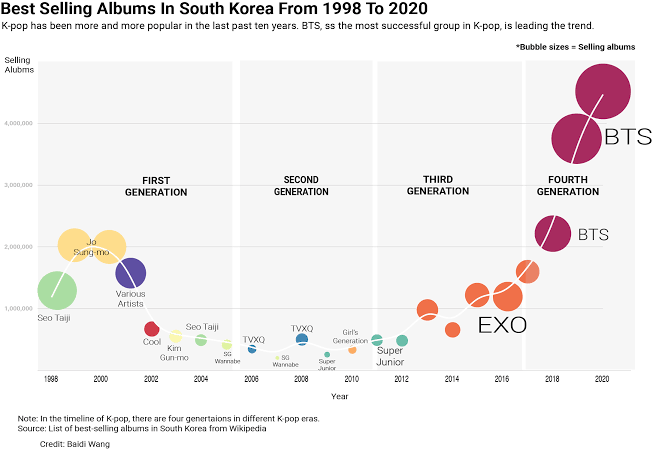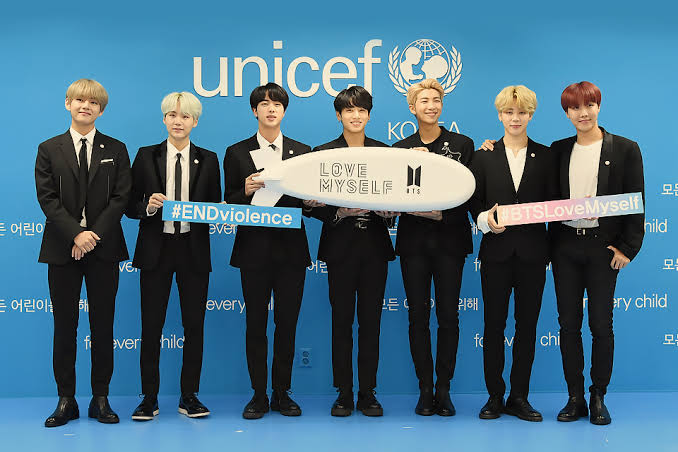BTS – Beyond the Music, Shaping Global Diplomacy
Similar to the gastrodiplomacy of global foods, music is another international influence; diplomacy extends beyond the confines of political summits and into the universal language of music.
Enter BTS, the South Korean powerhouse that’s not just breaking records in the music industry but also redefining the rules of international relations.
But how, you ask?
Through the soft power of K-Pop, BTS is weaving a vast network of cultural exchange that resonates with the global youth, proving that music can indeed move mountains and maybe even borders.
- Soft power is about influencing others through attraction rather than force. Think of it as the art of persuasion through culture, values, and policies.
- Constructivism focuses on how ideas, norms, and identities shape international relations.
BTS embodies both, transforming their music and influence into bridges of understanding and respect between cultures, thereby exemplifying a new kind of diplomacy on the global stage.

The Rise of K-Pop in International Relations
K-Pop’s journey from a niche genre to a global phenomenon is a story of impeccable craftsmanship and digital savviness. At the forefront of this wave is BTS, whose universal themes of love, struggle, and self-acceptance have attracted an army of fans worldwide. But what sets K-Pop, and BTS in particular, apart?
Firstly, it’s the holistic approach to entertainment – a blend of catchy tunes, viral dance routines, and visually stunning music videos.
Then there’s the authenticity and openness of K-Pop idols about their lives and challenges, making them relatable to a global audience. BTS, with their multifaceted talent and genuine personas, have not only captivated hearts but also sparked interest in the Korean language and culture, proving that music has no borders.
BTS as Ambassadors of Korean Culture
BTS’s role as cultural ambassadors goes beyond their music. Their participation in global events like the United Nations’ assemblies, where they’ve spoken about issues like self-esteem and youth empowerment, showcases their commitment to using their platform for positive change. Their concerts, a spectacular fusion of music and culture, serve as informal cultural exchanges, introducing fans across the globe to Korean traditions and social issues.
The impact of these activities on South Korea’s global image is profound. BTS has played a pivotal role in the Hallyu wave, boosting tourism and interest in Korean culture, cuisine, and language. Their influence extends to fashion, with traditional Korean attire gaining popularity, and diplomacy, as seen in their appointment as special presidential envoys for future generations and culture.
Through their music, social initiatives, and global presence, BTS has not just entertained the world but also illuminated the power of culture in bridging divides.
Their journey is a testament to how music and diplomacy can intersect, creating a lasting impact on international relations and perceptions across borders.

BTS’s Influence on Global Youth Culture and Politics
BTS’s influence extends far beyond the music charts, touching on vital social issues that resonate with young people across the globe. Through their “Love Myself” campaign in partnership with UNICEF, they’ve taken a stand against violence and encouraged self-esteem and well-being, showcasing the power of their platform to address mental health stigma. Their music, often laced with messages of hope and resilience, has become a source of solace and inspiration for fans navigating the complexities of modern life.
The group’s active engagement on social media platforms amplifies their influence, creating a digital space where fans are encouraged to support each other and engage in social and political discourse. This digital community fosters a sense of global citizenship among fans, motivating them to partake in charitable activities, awareness campaigns, and even mobilize for social justice causes inspired by the values BTS stands for.
The Economic Impact of K-Pop Diplomacy
The ripple effects of K-Pop diplomacy, spearheaded by BTS, have significantly boosted South Korea’s economy. The “BTS effect” on tourism is tangible, with fans flocking to South Korea to experience the culture that shapes their music idols. This cultural pilgrimage extends to increased demand for Korean language courses, cuisine, fashion, and beauty products, contributing to the global Korean Wave, or Hallyu, phenomenon.
This wave has not only elevated South Korea’s cultural exports but has also enhanced its international standing, positioning it as a major soft power on the global stage. The economic benefits are substantial, with BTS alone estimated to bring billions into the South Korean economy annually through music sales, merchandise, and tourism.
Challenges and Criticisms
Despite their global success, BTS and the broader K-Pop industry face their share of criticisms and challenges. Accusations of cultural imperialism point to the global spread of K-Pop potentially overshadowing local cultures and industries.
Additionally, the commercialization of K-Pop has raised concerns about the authenticity of its cultural diplomacy efforts, with skeptics questioning whether profit motives overshadow genuine cultural exchange.
Maintaining global influence also presents challenges, including navigating the diverse cultural norms and political sensitivities of an international fanbase. The industry’s intense demands and the scrutiny of the global spotlight can take a toll on artists, highlighting the need for sustainable practices within the industry.
Conclusions
- The global rise of K-Pop highlights the universal appeal of their music, storytelling, and connection with fans which has sparked worldwide interest in Korean language and culture.
- BTS has transformed music into a tool for diplomacy.
- To reach this transformative level, K-Pop groups have leveraged social media to address global social issues, fostering a supportive community among their fans and encouraging a new generation towards social and political activism.
- Despite facing criticisms of cultural imperialism and commercialization, Korean bands continue to navigate the complexities of global fame, emphasizing the need for authenticity and sustainable practices in the K-Pop industry.
References:
- ChatGPT. (n.d.). OpenAI. https://chat.openai.com/#
- Home – LOVE MYSELF. (s. f.). LOVE MYSELF. https://www.love-myself.org/eng/home/
- Romadhoni, F. (2023, 14 abril). How Kpop is Driving South Korea’s Economic Growth and Job Creation. Medium. https://medium.com/writers-blokke/how-kpop-is-driving-south-koreas-economic-growth-and-job-creation-6a1879f49c63









No responses yet